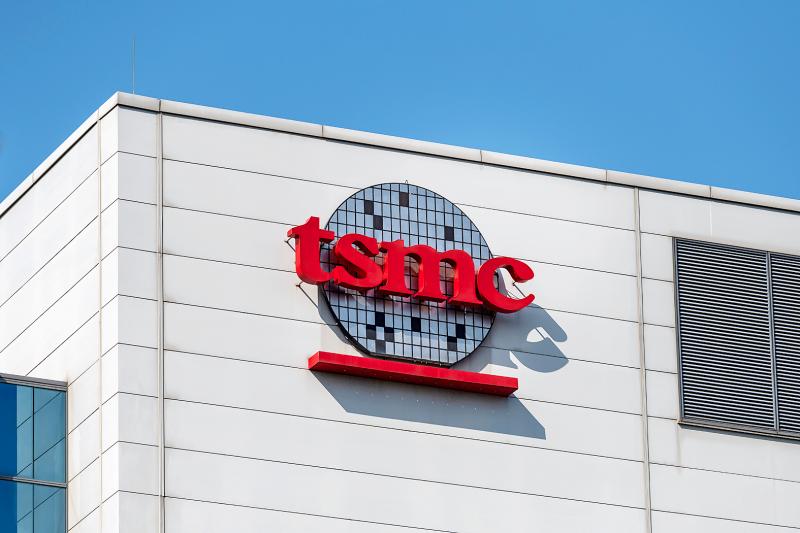Taiwan Semiconductor Manufacturing Co (TSMC, 台積電) is planning to build several more chipmaking fabs in the US state of Arizona beyond the one already planned, three people familiar with the matter said.
TSMC, the world’s largest contract chipmaker, announced in May last year that it would build a US$12 billion fab in Arizona.
The 12-inch wafer fab in Phoenix is expected to start mass production in 2024, the Investment Commission said in December, when it approved the plan.

Photo: Billy H.C. Kwok, Bloomberg
Three sources familiar with the matter, speaking on condition of anonymity as they were not authorized to speak to the media, said that up to five additional fabs are being planned for Arizona.
The initial fab is relatively modest by industry standards, with a planned output of 20,000 wafers per month using the company’s most sophisticated 5-nanometer process technology.
It is not clear how much additional production capacity and investment the additional fabs might represent, and which process technology they would use.
TSMC last month said it planned to invest US$100 billion over the next three years to increase production capacity, although it did not give details.
One person with direct knowledge of the matter said that the expansion was in response to a request from the US, but declined to provide further details.
“The United States requested it. Internally TSMC is planning to build up to six fabs,” the person said, adding that it was not possible to give a timeframe.
US President Joe Biden’s administration is preparing to spend tens of billions of US dollars to support domestic chip manufacturing. Under existing legislation, foreign firms are eligible for those funds, but whether they will ultimately receive them is an open question.
A second person familiar with the plans said that TSMC had already made sure there was enough space for expansion when it obtained the land for the first fab.
“It’s so they can build six fabs,” the source said.
The third person, from a TSMC supplier involved in the Arizona project, said TSMC had told them the plan was to build a total of six fabs over the next three years.
Reuters was not able to independently confirm the timeframe.
TSMC referred to comments by CEO C.C. Wei (魏哲家) on an earnings call last month, saying that it was starting chip production in Arizona in 2024, deploying 5-nanometer technology to produce 20,000 wafers per month.
“We have acquired a large piece of land in Arizona to provide flexibility. So further expansion is possible, but we will ramp up to phase one first, then based on the operation efficiency and cost economics, and also the customers’ demand ... decide what the next steps” would be, the company said.
Asked whether the planned expansion was because of a request from the US, TSMC said: “Once there is any official decision, we will disclose it accordingly.”

Taiwan yesterday denied Chinese allegations that its military was behind a cyberattack on a technology company in Guangzhou, after city authorities issued warrants for 20 suspects. The Guangzhou Municipal Public Security Bureau earlier yesterday issued warrants for 20 people it identified as members of the Information, Communications and Electronic Force Command (ICEFCOM). The bureau alleged they were behind a May 20 cyberattack targeting the backend system of a self-service facility at the company. “ICEFCOM, under Taiwan’s ruling Democratic Progressive Party, directed the illegal attack,” the warrant says. The bureau placed a bounty of 10,000 yuan (US$1,392) on each of the 20 people named in

The High Court yesterday found a New Taipei City woman guilty of charges related to helping Beijing secure surrender agreements from military service members. Lee Huei-hsin (李慧馨) was sentenced to six years and eight months in prison for breaching the National Security Act (國家安全法), making illegal compacts with government employees and bribery, the court said. The verdict is final. Lee, the manager of a temple in the city’s Lujhou District (蘆洲), was accused of arranging for eight service members to make surrender pledges to the Chinese People’s Liberation Army in exchange for money, the court said. The pledges, which required them to provide identification

Nine retired generals from Taiwan, Japan and the US have been invited to participate in a tabletop exercise hosted by the Taipei School of Economics and Political Science Foundation tomorrow and Wednesday that simulates a potential Chinese invasion of Taiwan in 2030, the foundation said yesterday. The five retired Taiwanese generals would include retired admiral Lee Hsi-min (李喜明), joined by retired US Navy admiral Michael Mullen and former chief of staff of the Japan Self-Defense Forces general Shigeru Iwasaki, it said. The simulation aims to offer strategic insights into regional security and peace in the Taiwan Strait, it added. Foundation chair Huang Huang-hsiung

’DISTORTION’: Beijing’s assertion that the US agreed with its position on Taiwan is a recurring tactic it uses to falsely reinforce its sovereignty claims, MOFA said The Ministry of Foreign Affairs (MOFA) yesterday said Chinese state media deliberately distorted Taiwan’s sovereign status, following reports that US President Donald Trump agreed to uphold the “one China” policy in a phone call with Chinese President Xi Jinping (習近平). During the more than one-hour-long call, Xi urged Trump to retreat from trade measures that roiled the global economy and cautioned him against threatening steps on Taiwan, a Chinese government summary of the call said. China’s official Xinhua news agency quoted Xi as saying that the US should handle the Taiwan issue cautiously and avoid the two countries being drawn into dangerous